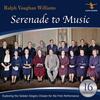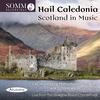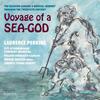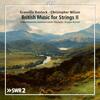View all recordings of works by this composer
A Woman's Last Words (1)Barcarolle (1)
By the Sea (1)
Captain Harry Morgan (1)
Celtic Songs (1)
Celtic Symphony (1)
Chanson de Mai (May Song) (1)
Cloisters at Midnight (1)
Dramatic Dances (3) (1)
Drinking Song: Hafiz to the Sultan Timour (1)
Fanfare for 4 trumpets (1)
Fifine at the Fair (1)
Ghazals of Hafiz (1)
Hamabdil (2)
Hebridean Symphony (2)
I Go to Prove My Soul (1)
In a Chinese Mirror: Quartet for strings (1)
Invocation to Pan (1)
Invocation to the Nile (1)
Jester Songs (2)
Macbeth (incidental music) (1)
Old English Suite (1)
Omar Khayyam (2)
Overture to a Greek Tragedy (1)
Ozymandias (1)
Pagan Poem (1)
Pagan Symphony (1)
Parade March (1)
Piano Pieces (12) (1)
Pierrot of the Minute (1)
Pippa Passes (1)
Praise ye the Lord (1)
Prometheus Unbound (1)
Rest (1)
Reverie (1)
Russian Scenes (1)
Sappho, for mezzo-soprano and orchestra (1)
Saul: A Symphonic Overture (1)
Scenes from the Scottish Highlands: Suite for strings (1)
Scottish Pieces (2) (1)
Serenade for string orchestra, 'In the Far West' (1)
Songs from Chinese Poets (1)
Song to the Seals (2)
The Bluebell Wood (1)
The Frogs, op.102 (1)
The Pierrot of the Minute (1)
The Sea Reivers (1)
The Singer in the Woods (1)
The Witch of Atlas (2)
Viola Sonata in F major 'Colleen' (2)
Violin Sonata no.3 in C major (1)

Sir Granville Bantock (7 August 1868 – 16 October 1946) was a British composer of classical music.
Granville
Ransome Bantock was born in London. His father was an eminent Scottish
surgeon. He was intended by his parents for the Indian Civil Service but
he suffered poor health and initially turned to chemical engineering.
At the age of 20, when he began studying composers' manuscripts, at
South Kensington Museum Library, he was drawn into the musical world.
His first teacher was Dr Gordon Saunders at Trinity College of Music. In
1888 he entered the Royal Academy of Music where he studied harmony and
composition with Frederick Corder winning the Macfarren Prize in the
first year it was awarded.
* This text is available under the Creative Commons Attribution-ShareAlike
License
* Wikipedia® is a registered trademark of the Wikimedia Foundation, Inc., a non-profit organization.
* Original page
Recent Bantock releases

Vaughan Williams - Serenade to Music
£12.69
(Albion Records)

Hail Caledonia: Scotland in Music
£10.79
(Somm)

Bax, Bantock, Gardiner & JD Davis - String Quartets
£14.51
(Dutton - Epoch)

Voyage of a Sea-God: 20th-Century Music for Bassoon
£25.43
(Hyperion)

British Music for Strings Vol.2: Bantock & Wilson
£12.69
(CPO)

This Curious Harp: 20th-Century British Music for Solo Harp
£12.69
(MPR)
 FREE UK SHIPPING OVER £30!
FREE UK SHIPPING OVER £30!